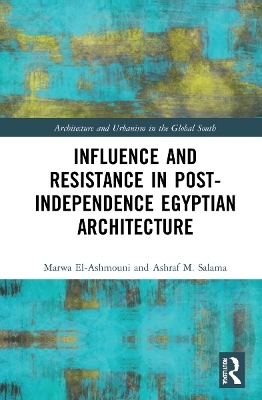
Influence and Resistance in Post-Independence Egyptian Architecture
Routledge (Verlag)
978-0-367-70362-2 (ISBN)
Influence and Resistance in Post-Independence Egyptian Architecture paves the way to genuinely debate a yet to mature twenty-first century’s architectural discourse in Egypt. This book is a key resource for architects, architectural historians, and critical theorists and will appeal to academics and to both graduate and advanced undergraduate students in architectural history and theory and Middle East and Global South studies.
Marwa M. El-Ashmouni is Assistant Professor in the Department of Architectural Engineering, Beni-Suef University, Egypt. El-Ashmouni earned her PhD from the University of Adelaide, Australia, and her master’s degree from Ball State University, USA. She worked as a tutor and a research assistant in both universities. El-Ashmouni was awarded the University of Adelaide Medal of Research Excellence (2013). Her interests include historiography of postcolonial architecture with special focus on the conditions generated by the intersection of decolonizing and nationalist policies. Her work focuses on cultural mobility, migration, diaspora, and cross-cultural encounters. She has authored numerous publications in the field of architectural history and theory. Her publications include a book chapter in Christiane Gruber, ed. Islamic Architecture on the Move (2016), entitled “Mobility and Ambivalences: Negotiating Architecture Identities during Khedive Ismail’s Reign (1863–879),” and an article titled “Interrogating Egyptian Nationalism: Transcultural Architecture at the Ragged Edge of Empire” in Archnet-IJAR: International Journal of Architectural Research (2018). Her latest work includes a recent article titled “Contemporary Architecture of Cairo (1990–020): Mutational Plurality of ‘Isms’, Decolonialism, and Cosmopolitanism” in Open House International (2020); a joint-authored book: Architectural Excellence in Islamic Societies (2020); and an article titled “Gazing at Egypt’s Museums: Toward a New Internationalism” in Archnet-IJAR: International Journal of Architectural Research (2021). Ashraf M. Salama is Professor of Architecture and recently appointed Head of the School of Architecture and Built Environment at Northumbria University, Newcastle upon Tyne, UK. He was the Head of the Department of Architecture at the University of Strathclyde Glasgow, UK (2014–2020). He holds a BSc, MSc, and PhD in architecture and has received his education and training in Al-Azhar University in Egypt and North Carolina State University, United States. With wide experience in academic research, teaching, and professional consulting he has led three schools of architecture in Egypt, Qatar, and the United Kingdom, two of which he has founded. He has published over 170 papers and book chapters and has authored and co-edited 14 books. He is the UIA 2017 recipient of Jean Tschumi Prize for Excellence in Architectural Education and Criticism. Salama is the Founding and Chief Editor of Archnet-IJAR: International Journal of Architectural Research since 2007. His books include Demystifying Doha: On Architecture and Urbanism in an Emerging City (2013), Architecture beyond Criticism: Expert Judgment and Performance Evaluation (2014), Spatial Design Education: New Directions for Pedagogy in Architecture and Beyond (2015), Building Migrant Cities in the Gulf (2019), Architectural Excellence in Islamic Societies (2020). He is currently working on Routledge Companion to Architectural Pedagogies of the Global South (2022).
List of illustrations. Acknowledgements. Introduction. Chapter 1:Influence, Resistance, and the Spaces of Local Discourse. Chapter 2:Global Conceptions and Incentives of Local Departures. Chapter 3:Historical Voice: Reoccurrence of Influence and Resistance. Chapter 4:Western Voice: Intertwined Attitude of Reference. Chapter 5:Configuration of the Local Discourse (1930s-1970s). Chapter 6:Reconfiguration of Space (1980s: 2000s). Chapter 7:An Outlook into the 21st Century: The Rationale of a Decolonized Discourse. Bibliography. Index.
| Erscheinungsdatum | 06.07.2022 |
|---|---|
| Reihe/Serie | Architecture and Urbanism in the Global South |
| Zusatzinfo | 1 Tables, black and white; 30 Halftones, black and white; 30 Illustrations, black and white |
| Verlagsort | London |
| Sprache | englisch |
| Maße | 156 x 234 mm |
| Gewicht | 660 g |
| Themenwelt | Naturwissenschaften ► Biologie ► Ökologie / Naturschutz |
| Technik ► Architektur | |
| ISBN-10 | 0-367-70362-9 / 0367703629 |
| ISBN-13 | 978-0-367-70362-2 / 9780367703622 |
| Zustand | Neuware |
| Informationen gemäß Produktsicherheitsverordnung (GPSR) | |
| Haben Sie eine Frage zum Produkt? |
aus dem Bereich


